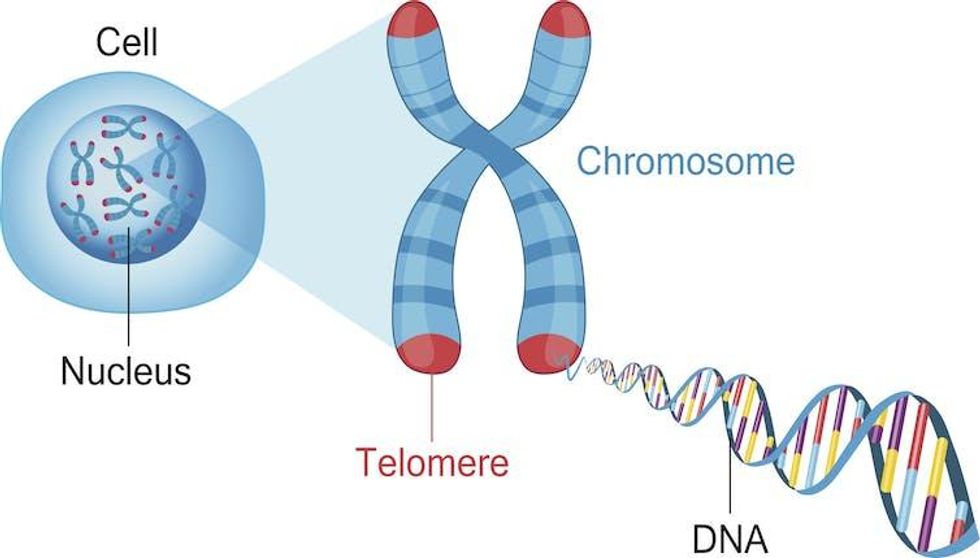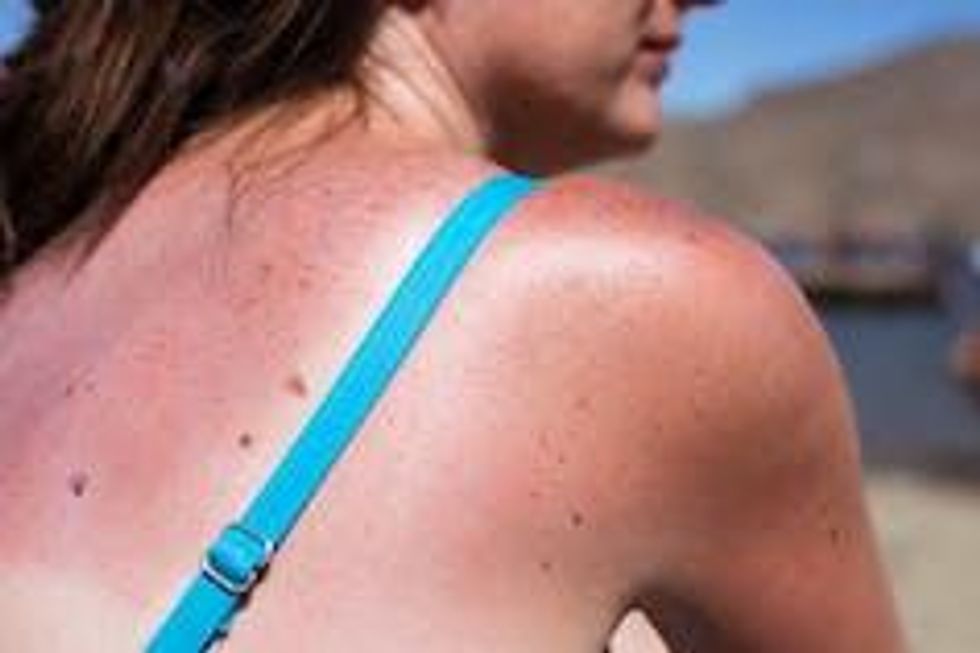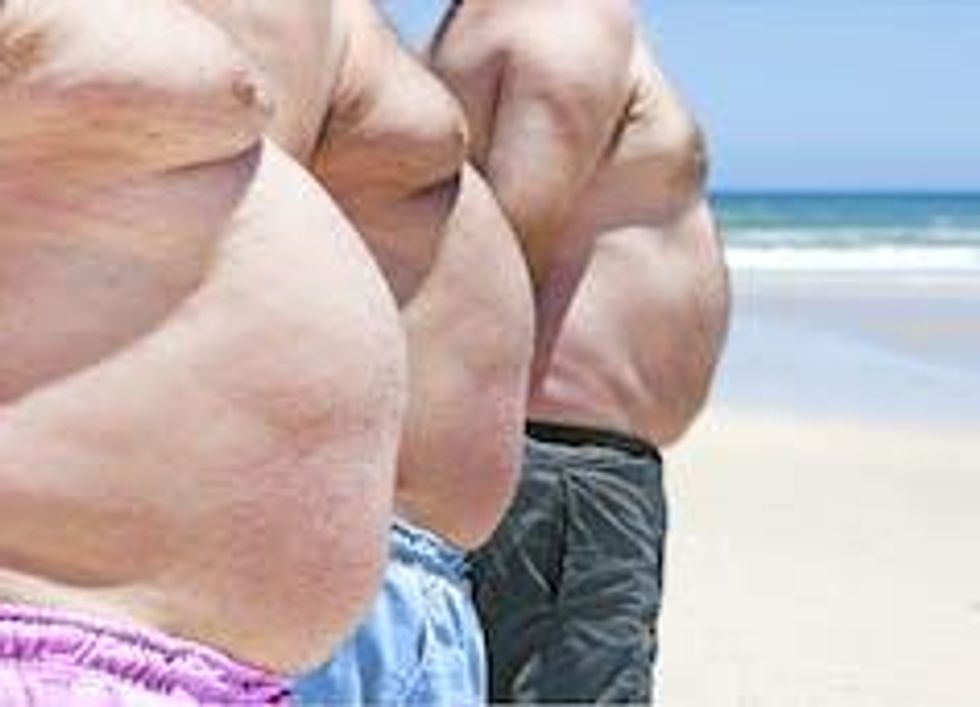Wellness
How Summer and Diet Damage Your DNA

By continuing to use our site, you agree to our Privacy Policy and Terms of Use.

Certain cells are particularly at risk. Your skin, for instance, is constantly being bombarded by high-energy UV light that wreaks havoc on your DNA. This UV light should not be taken lightly — 1 in 5 Americans develops skin cancer in their lifetime, more than any other cancer. So as you’re hitting the beach with sugary margaritas in hand, remember that deadly skin cancer rates are at record-highs, as are cancers associated with obesity.
I am a medical student in Dr. Patricia Opresko’s lab at the University of Pittsburgh, which stands at the intersection of two Nobel Prize-winning disciplines: DNA repair and telomeres. Telomeres are protective regions at the ends of our chromosomes that hold the DNA together like the plastic cap on your shoelace. Her lab’s work is revealing the molecular machinery that repairs your telomeres after UV and metabolic (related to energy extraction from food) damage, and the many ways it can go awry.
 Telomeres are protective caps on the end of chromosomes. By Fancy Tapis/shutterstock.com
Telomeres are protective caps on the end of chromosomes. By Fancy Tapis/shutterstock.comIn the minute you’ve been reading, hundreds of trillions of new lesions have occurred in your DNA. Fortunately, a special class of proteins is vigilantly detecting and repairing these errors.
Repair is particularly important in telomeres.
The telomere is no small thing, at least not figuratively: Their length is correlated with many symptoms of aging. Human studies have shown that people with shorter telomeres suffer worsened immunity and heart disease along with greater mortality. With every year, your telomeres get shorter, some cells stop replicating, and these symptoms worsen. We do not yet know whether telomeres are the secret to aging. What we do know is that UV and metabolic damage, which further shorten telomeres, can trigger cancer and aging; when you break the plastic cap, you unravel the whole shoelace.
 A nasty sunburn can induce DNA damage in skin cells leading to skin cancer. By Jingjits Photography/shutterstock.com
A nasty sunburn can induce DNA damage in skin cells leading to skin cancer. By Jingjits Photography/shutterstock.comBathing our skin in UV light causes an onslaught of damage. In fact, regular skin cells from older adults have about as many mutations as cancer cells. At best, the sun’s dangerous rays can cause the skin cells to commit suicide and flake off. At worst, those cells remain and become cancerous.
One such “molecular sunburn” is called a photoproduct, which forms when the energy from UV light causes two adjacent units of your DNA to stick together, potentially interfering with its normal function. Ten thousand photoproducts occur in every skin cell every day due to sun exposure.
Telomeres are especially prone to such damage. And although telomeres don’t contain valuable body-building instructions like genes, when photoproducts damage our telomeres, a cell can turn on a special protein called telomerase which makes the telomeres longer. This might sound like a way to stay forever young. After all, aren’t short telomeres the culprit of aging? But in extending its telomeres, the cell no longer has a limit to how many times it can replicate. This explains why over 85 percent of all cancers exhibit extended telomeres. It seems that while longer telomeres are the key to our immortality, under the wrong circumstances, they can also be our downfall. When we fail to use UV protective sunscreen to safeguard our telomeres, we are, quite literally, flying too close to the sun.
 Overeating causes the production of more DNA damaging molecules that can harm telomeres, in some cases causing cancer. By Tish1/shutterstock.com
Overeating causes the production of more DNA damaging molecules that can harm telomeres, in some cases causing cancer. By Tish1/shutterstock.comYour metabolism, which breaks down food to extract energy, generates high-energy particles called free radicals that, like UV light, can distort the units in your DNA. This, in turn, wears away at your telomeres. Such metabolic damage accumulates over a lifetime of eating. Scientists believe this is why older, overweight adults, who have spent many years metabolizing more food than average, have a far greater risk of telomere shortening and cancer. Moreover, it seems diets rich in antioxidants, found in fruits, vegetables, nuts and legumes, which counter that metabolic damage, actually protect telomeres as well.
While our telomere length once seemed pre-determined by our genes, the more medical researchers learn, the more we realize the impact of our lifestyles. Smoking, UV-light exposure, obesity, lack of exercise, stress and poor diet can all diminish our telomeres, squandering our molecular fountain of youth.
In Dr. Patricia Opresko’s lab, we are investigating how telomere repair keeps up with the damage wrought by our daily lives, as well as the dire consequences when it no longer can. The hope is that by better understanding the mechanisms of cancer formation, we can design better therapies. Yet our findings are important not only for treating cancer, but also for preventing it.
My grandfather lost his battle against an aggressive form of skin cancer just weeks before my bar mitzvah. My grandmother, who valued education above all else, died of cancer days prior to my high school graduation. Their untimely loss inspired me to take up research in the very center where they received their care. Every cancer cell I study, and every hallway I walk, I am reminded of my grandparents and the countless other like them that could benefit from our research.
As King Henry VIII noted, time is the only invincible opponent. My grandparents are among the billions who succumbed to the onslaught of time. In studying telomeres, many are searching for an elusive fountain of youth that can reverse aging and overcome death. Yet the answers that we uncover are far less fanciful. It is not our telomeres that shorten our lifespans but our lives that shorten our telomeres. As many as half of medical deaths in the United States are preventable. Small choices as simple as using UV-A and UV-B protective sunscreen, eating smarter and exercising regularly can go a long way in empowering us to take command of our health.
We still have much to learn before we can use the secrets of our telomeres to surpass the limitations of our genetic makeup. But there are countless steps you can take today to protect your telomeres from the sun and from yourself. Research barters in knowledge, but it is action, inspired by knowledge, which can keep families like mine together for longer.
Adam Barsouk is a Research Assistant at the University of Pittsburgh.
This article was originally published on The Conversation. Read the original article.